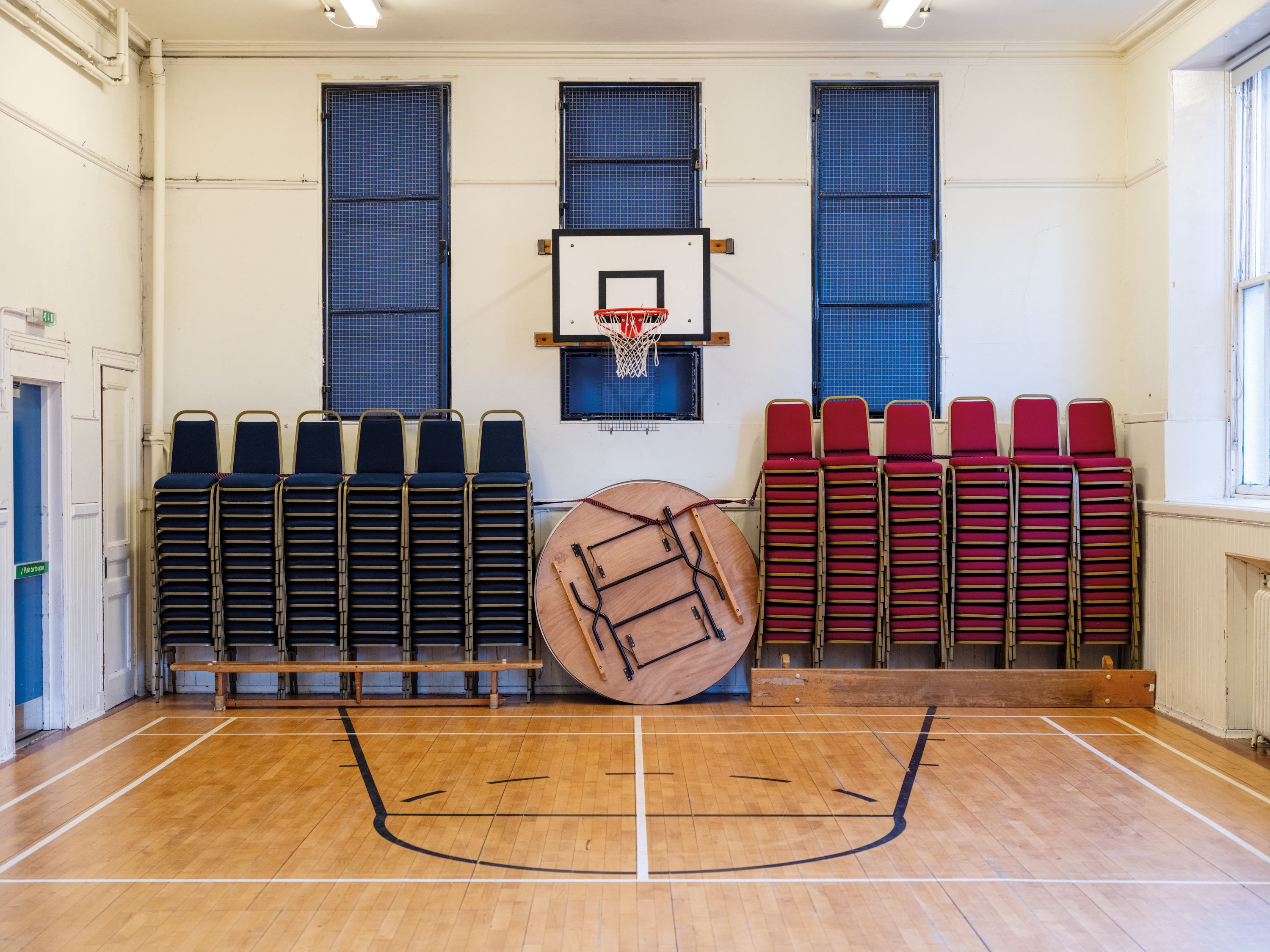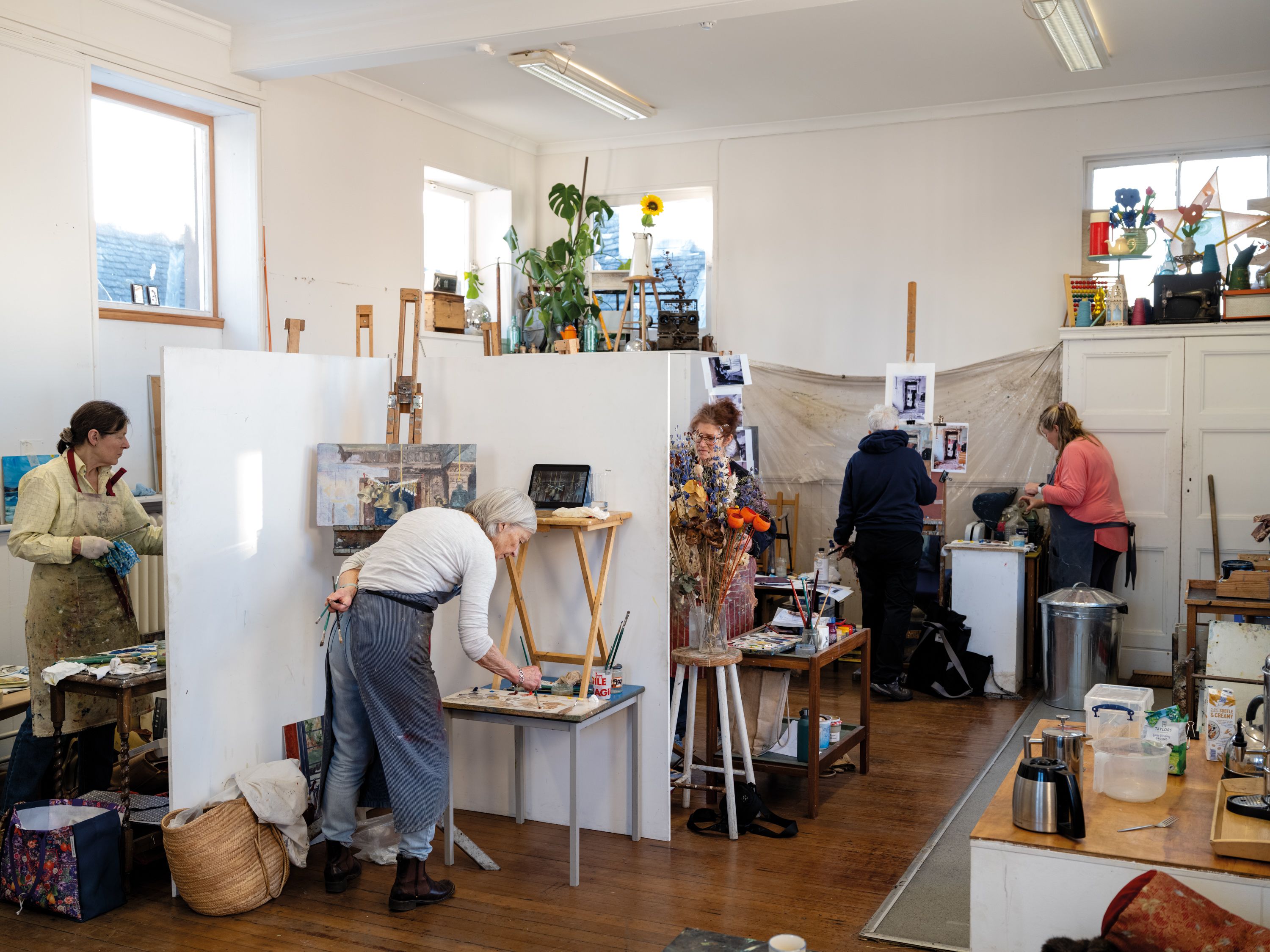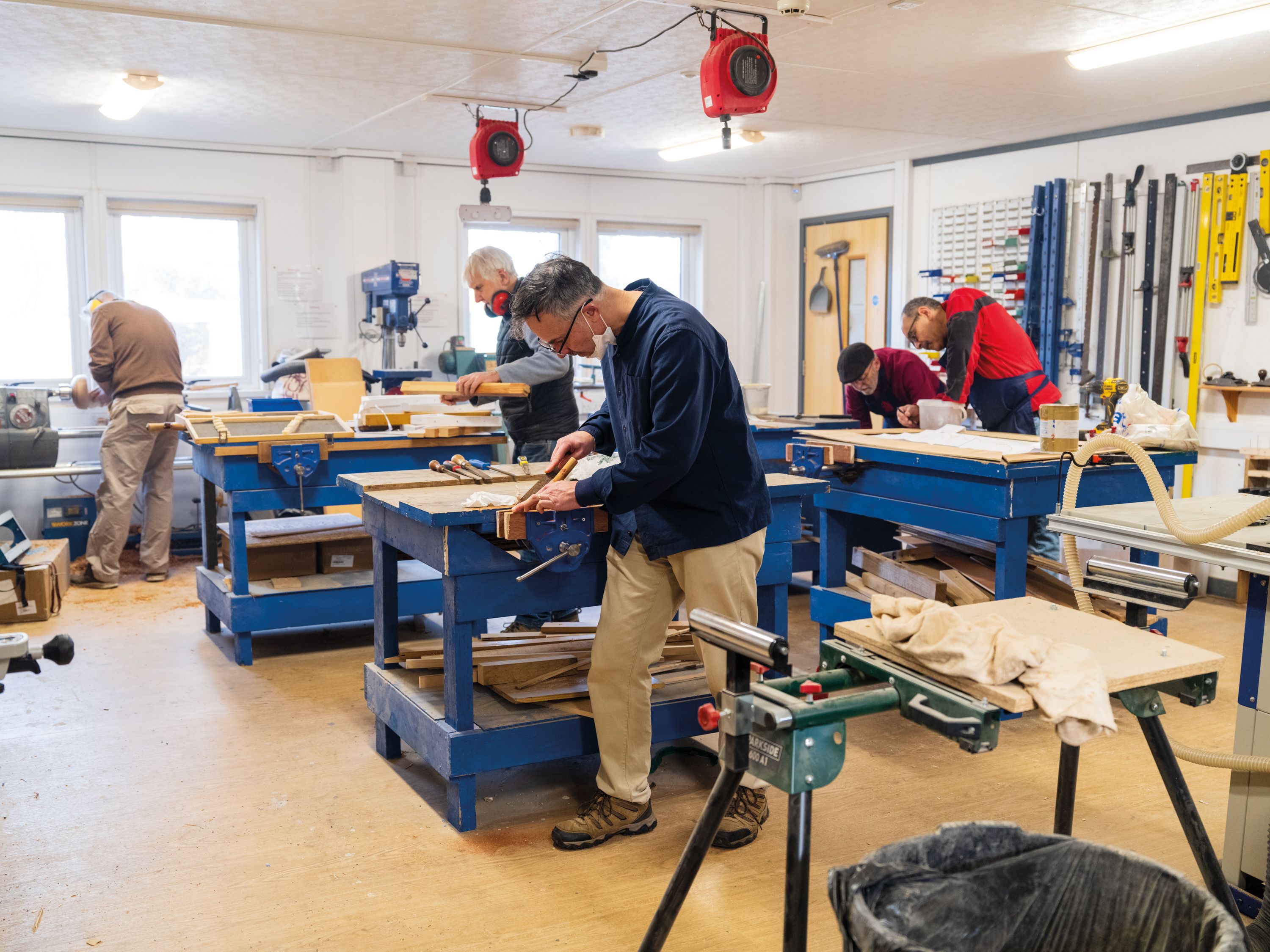How we meet: tackling loneliness and isolation in Britain today
Loneliness and social isolation is a growing problem across the west with its impacts being felt across society.
But how can our politics respond today?
And what role can it play in supporting the places and ideas that bring us together

Back in 2018, the then Prime Minister, Theresa May appointed the first ‘Minister for loneliness’. The creation of this role won plaudits around the world - it was celebrated by mental health experts, business leaders, charities, and millions of people who had suffered in silence for far too long. It seemed that the moment had come to grasp the nettle of one of the most prevailing, yet overlooked, crises of our times.
And yet now, six years later, it feels as if loneliness has dropped off the political radar. Once more, leading political figures take to the television screens to say that the rise of a mental health crisis in part driven by social isolation is overstated. Those suffering just need to buckle up and get to work.
Yet, for all the political bluster, the crisis grows, and spreads throughout communities. Its hidden nature is partly because loneliness isn’t something one likes to admit to. It seems to come with a stigma. An admission of loneliness comes with a deep sense of failure, a feeling that we have failed to connect in a world of ever-greater connectivity.
But its consequences are very real.
We know that when we feel isolated and alone, life becomes darker, which can lead to depression but also to other physical complications. The less we see people, the less we go out; the less we go out, the less we exercise or take in fresh air. All of this is to say that loneliness and isolation get to the core of some of Britain’s toughest social challenges, from complex health challenges to failures to enter the labour force.
So when politicians say it is an issue that ranks far below the ‘serious’ work of lowering waiting lists in the NHS or tackling unemployment in the economy, we might ask: what if connection, social isolation, and loneliness actually go to the heart of these challenges? What if they speak to the long-term challenges facing Britain and other developed economies? And what if a deeper understanding of how we find and build connections is the bedrock of igniting a flourishing society?

I realised all of this when I sat down with Charlie, who I had asked to show me around The Men of Leith Men's Shed, a small bungalow on the grounds of an old Victorian school turned into a community space called The Heart of Newhaven. The Men’s Shed is a space where men can come to do woodwork, make friends, and generally feel connected with others.
A former teacher and NHS worker, Charlie soon realised that retiring wasn’t for him.
“When I first stopped working,” Charlie says, “I walked down to my shed at the bottom of my garden to start tinkering and realised to myself, ‘God, is this it? Am I on my own in this shed now?’ I just found that thought incredibly isolating.”
Men’s Shed started in Australia with a straightforward mission: to “encourage people to come together”. Using making as a way to reduce loneliness and combat social isolation, Men’s Shed is a haven for that very core human desire for meaning through the people we meet and the things we make.
The place is alive with noise and the fuzzy smell of sanding. Along with making and creating, the men also have a band, ‘The Splinters’, who play local gigs and jam together. On a Wednesday, Charlie runs a lunch get-together for all members—they’ll have guest speakers on everything from World Cup history to pottery.
“And then every so often,” Charlie says, “we’ll have a talk on prostate cancer or on how we can support those living with dementia. A lot of the blokes are carers as well as makers.”
Charlie has seen how important these sessions have been for his mates. “It’s all about friendship and fun, but we also throw in one of those learning sessions—it has huge benefits for the lads.”
Not for the first time, during a visit to a community project with the UCL Policy Lab, I’m struck by how a focus on connection, belonging, and place opens up a broader conversation, helping tackle the other challenges we might face throughout our lives
The work being done by Charlie and his mates is precisely the kind of preventive approach which Sir Keir Starmer supported when he said “...our public services have increasingly become crisis services – dealing only with expensive end results, not preventing them from occurring in the first place.”
In fact, the Prime Minister’s continued commitment to playing five-a-side is a great example of how the bonds of friendship are crucial to a fulfilling life. If the PM needs that time to just be with friends and connect, then why not everyone?
In Newhaven, it’s being done with the grain of people’s lives, with the light support of emerging organisations, tasked not with command and control but with a belief in letting go—supporting the doers in places across the UK. Warm Welcome is one such emerging disrupter – supporting real change with a lightness of touch not seen in traditional charities and state bodies.

“In isolation and loneliness, there is the opportunity to support and respect those who feel they’ve been forgotten. It gets to a very deep well of both anger and an opportunity for those politicians willing to roll up their sleeves.”
The Warm Welcome Campaign emerged in 2022 as a response to the energy crisis and a desire to help people find ‘warm spaces’ in their community to get them through the winter if they were struggling to heat their homes. But the Campaign quickly realised that the human warmth on offer from its network of ‘Warm Welcome Spaces’ was just as important as the physical warmth, and so it has pivoted to supporting these Spaces all year round by offering help with funding, volunteers and getting the word out to those who might need a local place to belong.
Its founder and Campaign Director, David Barclay, underlines the importance of the work being locally led.
“We learned in that first winter that people might come for the warmth but they stayed for the welcome” says David. “So when 97% of our Spaces told us they were staying open beyond the winter, we knew we had to be there with them, and we set to work building partnerships with businesses, funders and expert charities who could offer these local groups the resources they need to flourish in incredibly difficult circumstances.”
Since that first winter in 2022, the Campaign has blossomed, and recently celebrated The Heart of Newhaven in Edinburgh as its 5000th registered Space, with over 2/3rds of the UK population now living within a 30-minute walk of a community space highlighted on the Warm Welcome map.
It gets back to a sense that there is a way in which our connection to others and the networks they create are the foundational elements in how we interact with the state and the broader economy. We’ve explored it at the UCL Policy Lab, and it’s something Noreena Hertz, author and UCL fellow, explores in her book The Lonely Century.
In her work, Hertz speaks of how loneliness is not only being “bereft of love, company, or intimacy” by friends and family but also feeling unsupported by fellow “citizens, our employers, our community, our government”. Disconnected not only from those “we are meant to feel intimate with but also from ourselves”, feeling “politically and economically excluded” as well.
But if we have this evidence and know that loneliness is not only killing people but is also having devastating impacts on society, a focal point of our politics?
Returning to my conversations in Newhaven, there is a feeling that loneliness is an issue facing those at the edges—a minority who must be targeted with help.
But as Charlie pointed out when I spoke to him, the Men’s Shed has everyone from retired barristers to former labourers, and the wider space is used by parents and teenagers alike.
It’s important to remember that this isn’t just about retirees or parents who feel isolated. There is a growing body of research showing that loneliness and social isolation are an increasing problem for 18-24 year olds.
The idea that loneliness and isolation are distant issues, simply a symptom of social deprivation, no longer feels true. With the growth of new technology and changing work, a growing number of us are suffering from being the proverbial lonely person at a busy party. Surrounded by whirring technology and marketing which promises us limitless connectivity yet a feeling of isolation persists. It is a connection contradiction—an unsettling feeling of failure.
To tackle the issue, we must bring social connections more central to the national debate. That perhaps calls on us to have a more fundamental think about how and where we see loneliness, connection, and belonging. There is a feeling that politics and policy feel abstracted from people’s lives. In part, we can point to politics’ failure to engage on connection, isolation, and loneliness as one of the causes.
A deep focus and understanding of places such as The Heart of Newhaven would be one starting place. Another would be to think about the organic and often everyday ways we come together and create community in our modern world.
Both sides of politics tend to yearn for a form of connection that is no longer with us instead of focusing intensely on the ones that exist today. For the left, union solidarity and the forging of social bonds through mutuals is seen as the great goal, while on the right, there remains hope of a return to the civic bonds that came from the church.
Yet, how often do both sides of our politics seek to engage and understand today’s places of connection, meaning, and gathering?
Look, and you will find the union halls and Sunday services of our age, from the independent gyms booming across the country to the fishing clubs (fishing remains the largest participation sport in the UK, with over three million line fishermen across Britain) that can be found between our cities and on the edges of our former industrial towns.
Just as in The Heart of Newhaven, you see people working against a system that little supports or recognises their value, let alone takes an interest in telling their story. Whether it is the gym owner who weathered the storm of COVID or the local group who come together to support one another in a cost-of-living crisis, these networks tear away the corrosive toxin of loneliness and forge something on which a stronger society and economy can sit.
In recent months, there has been a long list of pieces on a range of topics which can be considered ‘social connection’, ‘loneliness’, and ‘social isolation’. And yet still, politics seems to struggle to respond. Those of us who work in think tanks too, must ask why these issues go left untreated and why so many of us feel that social connection is kept away from the big debates within our politics.
This sense that we’re searching for a sense of place and belonging is also present in the culture. Recent TikTok and Instagram trends explore how we pause to reflect and connect.
In a recent interview, reflecting on the state of connection in our modern world and the recent loss of his mother, the actor Andrew Garfield expressed this emerging sense that all is not well. And that across the developed world we are wanting for something more.
“I think it’s so easy now to feel hopeless in this current state of the world,” he said. “And we can feel quite numb, we can feel quite disconnected and isolated, but I don’t know, I feel like the longing lives in all of us—the longing to connect, the longing to love, the longing to risk.”
If this longing exists, and if our modern world has created warriors for this want, then it surely must be for our politics to respond—to enable us to reach out to a deeper sense of belonging.
Politicians of all stripes spend elections struggling to connect with the lives of those they seek to serve. They know all too well the frustration and disconnection people feel with politics. A focus on social connection and place could be a great way to bridge those divides. The Prime Minister recently spoke of “the forgotten men and women” in relation to voters’ views on social and cultural issues. Yet, on social connection, politics seems to have lost its focus.
In isolation and loneliness, there is the opportunity to support and respect those who feel they’ve been forgotten. It gets to a deep well of both anger and an opportunity for those politicians willing to roll up their sleeves.
I was reminded recently by Maff Potts, a core member of the UCL Policy Lab and JRF Ordinary Hope Project. Maff has recently written a book Friends and Purpose: Stories from sofas on streets and some confounding ideas for tough times, drawing on his experiences as founder of Camrados, an organisation designed to build connections and friendships.
“There is a growing sense we are surviving alone. And this has huge impacts on us all.” Pott says.
Yet Potts was clear that this wasn’t about calling on politicians to pull the leavers from Whitehall but to support those in communities with the answer.
“In this area, it’s about building agency. The most powerful 6 words are “Can you do me a favour?” in that phrase you convey to someone who might be feeling lost and hopeless that they are trusted, valued, that they belong and that they might have the power, the power to hold an answer that you don’t have. It’s a huge injection of purpose, just by turning charity on it’s head and asking THEM for help. It makes them feel great and is way more effective than just helping them”.
As Potts’s book so brilliantly makes clear, this can’t just be done from distant government bureaucracies or charitable institutions but through the support for places and the people that make them.
In the coming years, the technology and systems promising us connection will only grow. We must foster some foundational feeling of human touch, knowing, and love. To do this, politics must engage with the real work of supporting and giving space for social connection and the tackling of loneliness.
As I wander around The Heart of Newhaven, I’m struck by the vibrancy and energy of the place. People coming and going, from all walks of life—this isn’t just about tackling our ‘problems’ but is, in fact, a celebration of a place and its people. It is full of sparks that come from a place of belonging, which have real-world impacts— not just for those who use it but for the place itself.
It provides the vibrancy and footfall which give a place its social and economic rhythm.
Our capacity to create more places like it, led by ordinary people, will be the mark of national renewal—the slow work of strengthening bonds between us, and renewing the connections that allow life to truly breathe.
Learn more about The Heart of Newhaven here.






